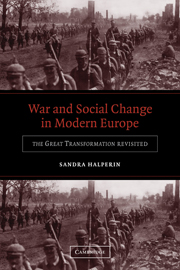Book contents
- Frontmatter
- Contents
- Tables
- Preface
- INTRODUCTION
- 1 Conflict and Change in World Politics
- I SOCIAL FORCES, INDUSTRIAL EXPANSION, AND CONFLICT IN EUROPE'S NINETEENTH-CENTURY MARKET SYSTEM
- II THE INTERREGNUM
- III THE GREAT TRANSFORMATION
- Appendix 1 Europe Defined
- Appendix 2 A Sample of Europe's Class, Ethnic, and Imperialist Conflicts, 1789–1945
- Appendix 3 European (Regional and Extraregional) Wars, Insurrections, Rebellions, Revolutions, Uprisings, Violent Strikes, Riots, and Demonstrations, 1789–1945
- Works cited
- Index
1 - Conflict and Change in World Politics
Published online by Cambridge University Press: 06 July 2010
- Frontmatter
- Contents
- Tables
- Preface
- INTRODUCTION
- 1 Conflict and Change in World Politics
- I SOCIAL FORCES, INDUSTRIAL EXPANSION, AND CONFLICT IN EUROPE'S NINETEENTH-CENTURY MARKET SYSTEM
- II THE INTERREGNUM
- III THE GREAT TRANSFORMATION
- Appendix 1 Europe Defined
- Appendix 2 A Sample of Europe's Class, Ethnic, and Imperialist Conflicts, 1789–1945
- Appendix 3 European (Regional and Extraregional) Wars, Insurrections, Rebellions, Revolutions, Uprisings, Violent Strikes, Riots, and Demonstrations, 1789–1945
- Works cited
- Index
Summary
In The Great Transformation (1944), Karl Polanyi chronicled the rise of a self-regulating market system in Europe in the early nineteenth century and the “great transformation” that occurred when the system collapsed in the course of the world wars. Two features of this chronicle, in particular, have made the book a focus of interest for scholars over the more than half a century since it was written. First, its account of the social implications of the new system presented an eloquent and powerful testimonial to the ravages generated by the commodification of land and labor and the operation of unregulated markets. Second, in explaining how and why the system collapsed through a contradictory “double movement” of expansion and protection, Polanyi offered a key and enduring insight into a universal dynamic of growth and change.
Polanyi's analysis was concerned to demolish two notions that pervade liberal thought. First, in arguing that the market emerged as a result of deliberate state action, Polanyi rejected completely the notion that the self-regulating market was in any way “natural” or that it “evolved” or arose spontaneously as a result of the expansion of trade. His keen insights into how the international institutional context shaped the development of national markets strengthened the argument. Polanyi's most insistent claim was that the unregulated market constitutes a threat to human society, and he argued that, irrespective of whatever indices are marshaled to show an improvement in living standards in the nineteenth century, the fact remains that the unregulated market wrought a social catastrophe in Europe.
- Type
- Chapter
- Information
- War and Social Change in Modern EuropeThe Great Transformation Revisited, pp. 3 - 48Publisher: Cambridge University PressPrint publication year: 2003



